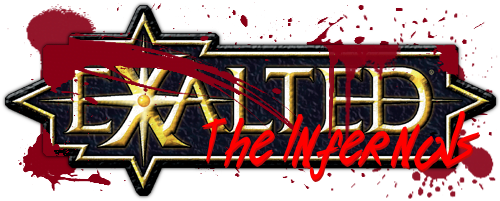First things first, before we go anywhere.
Content Warning
The gamebook I’m going to discuss here is shot through it with a bunch of stuff that’s just going to fall under the category of what I call ‘content-warningy.’ The Infernals is a book marinated in a needless ‘edgy’ nastiness that means a perfectly normal seeming paragraph about negotiating for barley can break out with a random reference to sexual assault.
It’s not even a single enclosed space – no singular concept, no page section. This isn’t like there’s one super horrible character, or one terrible scene. It’s worse than that, it’s that throughout this entire guidebook, there is a non-stop constant and oppressive threat that the book will bring up something unnecessary and gross, mistaking mentioning taboo things as wielding them well.
I have beeves about this book and yet also loves, but I want to warn you against reading it at random, because in its attempts to be horrifying and edgy with its ‘villainous’ content, there’s a lot of this book you kind of have to ignore. Normally, I’ll warn you about a thing, or a type of thing in a work, but in this case, I just want you to know up front I don’t think you should read this book. As a general rule.
I will not be talking about that stuff, except in a broad sense to criticise the thoughtless way this book uses these subject matters. I’m not going to trot out specific examples of things just to criticise them, but I am going to mention:
- Abuse and Abusers
- Self-Harm
- Sexual Assault spoken about callously
- Mental health and identity issues
- Anger and revenge
- Public executions
If you want to go elsewhere today, I am okay with that. Here, go somewhere else, look at something nice.
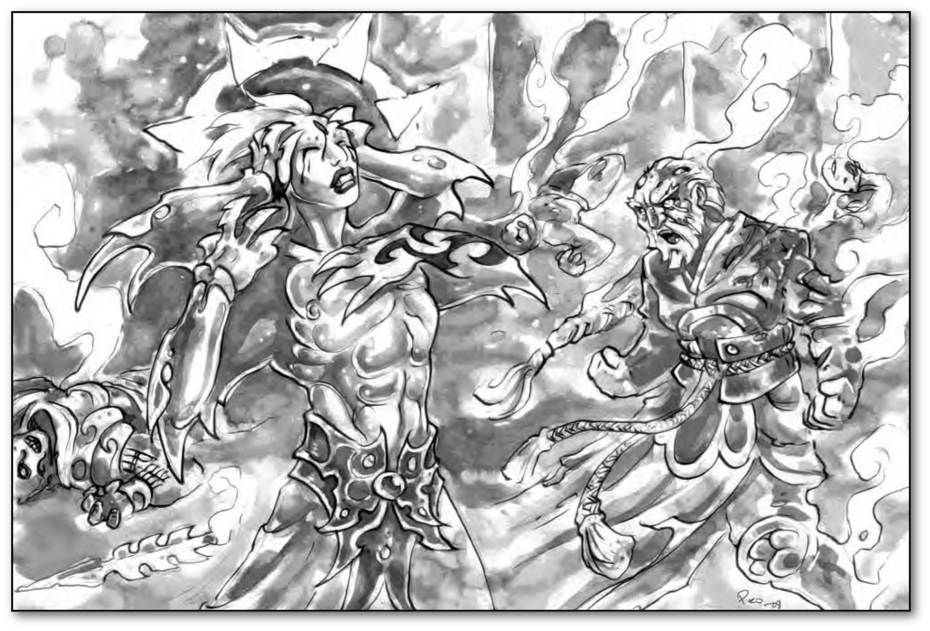
Mostly there’s one full source for Infernals; there’s only one gamebook for them, a second edition sourcebook. Onyx Path have suggested they plan on making one for third edition, which means it should be along sometime in 2030. For now we’re going to be limiting ourselves to the one sourcebook, Manual of Exalted Power – The Infernals. It was published in 2009, which is way, way too recent to get any kind of ‘it was a different time’ pass.
We’ve talked about Exalted as a setting full of these wandering half-gods. This book is about how to make and play an Infernal. What’s an Infernal? Well, okay, this is… complicated. See, part of the problem with Exalted is that it’s so unlike anything the only real way to describe the things in it is to draw comparisons to other things within it. It’s really deliberate in this setting; while White Wolf’s normal mechanical ouvre is to make one engine, then hack it apart for as many different other games as possible, you can still say ‘Instead of Beast, you have Paradox,’ and they all fill the same basic rules. It’s even explicit in the setting, in this case. For example, Abyssals are Solars corrupted by the Neverborn (dead megagods) to fulfill their dark purpose of feeding all of reality into the maw of a great woodchipper.
Infernals are Solar Exalts, whose exaltation has been mutated to serve the purposes of creatures known as the Yozis, and as with this neverending tour guide spiral down into the depths of this book you’re left going ‘okay, wait, who are the Yozis?’
Up until now I’ve jokingly used the term Megagod to describe the Neverborn and the things like them, because it’s really what they are. They’re the gods above the gods. Oh, they’re supposedly more important because of mythological significance, but in practical terms, all they are the next layer up, the next set of suits and ties. Well, the term the game lore uses for these Megagods is Primordial and describes things that are meant to be personifications of fundamental things in the universe, and also people, at the same time. It’s that kind of setting.
Anyway, the Primordials used to run the world and got distracted playing Games of Divinity. Gods got mad at them, made Exalts, and came to mess up the Primordials. A big war ensued. The Neverborn are the ghosts of Primordials that died, but some Primordials didn’t die – they were too fundamentally important to the universe. Instead, they were made to promise they’d never ever attack Creation again, and turned into a prison to contain themselves.
As is the tradition of Exalted, they did this in a hilariously unnecessary and yet impressive way.
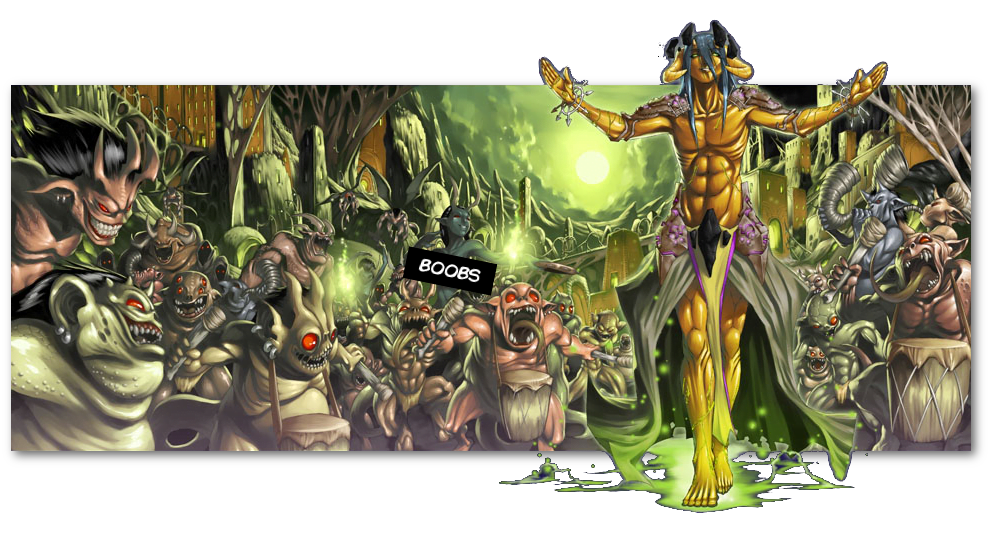
See, the Solars beat Malfeas, the original Creator God, and a handful of other Primordials who surrendered with him agreed to Knock It Off. To imprison them, the Solars turned Malfeas inside out and stuffed everyone else inside him. That’s not the only Primordial they turned inside out, mind you – there’s an unkillable dragon down in Malfeas, whose prison is made up of its own body. What I’m saying is that someone thought that turning people inside out was such a great idea they did it twice. Anyway, this means that The God Of Creation is now an inverted mega-city plane of hell, one of those fantasy-universe nonsenses of an enormous city that has both gates and a place to exist in, but is also too vast to map. This hell is called Malfeas. The city is called Malfeas. The plane they’re on is called Malfeas. The Yozi these things personify is called Malfeas. This does get annoying, yes.
That’s our staging zone, though; the plane of Malfeas, the hell of bug people and ape people and half-dragons and whatever other weird stuff the artists threw it in on a basis of ‘sure why not.’ The Yozis are basically the Megagods of this realm, and they tinker with a stolen handful of Solar Exaltations to make Infernals. Infernals aren’t just demonic slaves, though, because if they were, they might be unable to recognise a poor bit of judgment from their owners (and you can bet that was a hard point to negotiate for the people making them). The Yozis train and raise and indoctrinate and guide their Infernals, trying to make them into the perfect agents for their general plans (taking Creation) and specific plans (in a way that screws over the other Yozis). As great as these Yozis are at what they want to do, the Infernals are kept at player levels of power and not just automatically win things because the Yozis are powerful but also dizzyingly incompetent.
See, the Yozis are megagods that are outside Creation, hate it, but are almost unable to interact with it. They’re all incredibly mad (as in angry) and also incredibly mad (as in psychologically damaged). The Yozis are basically hell, and in hell. They’re also all in the broadest possible way, overwhelmed by one very specific vision of a particular kind of psychological damage, usually amped up to be the explicit action of an abuser.
I’ve said in the past talking about – of all things – Transformers, that there’s a style of talking about abuse and mental health that feels a bit like someone left the TV on during Oprah at some point. It’s not meant to be critical of Oprah, but rather the type of deep diving on a topic you can do to a room full of people expecting to buy soaps and deal with ad breaks. Impressions that seem handleable. It is this handleable space where the Yozis live, each one being essentially a megagod of their particular abuse pattern.

Malfeas is a self-loathing, violent abuser who punishes everyone around him for his own self-hatred. The city crushes its population, collapsing and restructuring sometimes in caprice and at whim, destroying and killing just to make some sort of momentary respite for the disappointed Angry Daddy of Hell. Malfeas is a loud, shouting monster, someone who used to be the boss, and now he’s a lesser boss, he’s an asshole of a boss. His powers connect to violence in its most base expression, to just demonstrate power on people as a blow to the head – and he does this in wild, unpredictable, and utterly random ways. There’s literally no way to be safe from it, and at the same time, no way to predict it. Some days, you just get hit.
Cecelyne is a harrowed unjust fascist. Formerly a maker and keeper of laws, she at one point did the right thing, she played by the rules and was punished for it beyond all reason (in her perception). The trauma of losing so thoroughly means that she now still sees herself as intensely based on and around laws, but those laws are in no way fair. Cecelyne will make rules that conflict, then punish you for failing to follow the rules. Rather than rules that serve the ruled, she makes rules that serves the maker of rules. If Malfeas is Hell’s Angry Daddy, Cecelyne is its Eternally Disappointed Mother.
She Who Lives In her Name is an obssessive-compulsive who will be able to get everything sorted out if you just sit still. Once, she set up rules that would make all of Creation work without the need for Gods and the Primordials, and they all said ‘Nah’ so she went along without it because she believed in hierarchy. Now, she’s mad at them for not going along with her, and really, just wants everyone to stop making the wrong choices. She Who Lives in her name acts out of spite – if you can’t make the things she wants to make, you shouldn’t be allowed to make anything.
Adorjan is literally a heated gamer moment.
The Ebon Dragon is betrayal itself; he was created before the fall of the Yozis, to literally be the shadow that light opposed. He is the boogeyman, the thing in the dark, and he betrays everyone – literally everyone. It is fundamental to his nature, in all things, at all times, that eventually he betrays you, and he can’t not bring himself to do this.
Also, special mention to Kimbery, Lady Not Appearing In This Book. She’s the sea underneath Malfeas, acidic and dreadful, and uh, she loves people. She loves people so much she swallows them up in her love, because she can’t bring herself to let them go, even to breathe.
These things, the Yozis are alien and ancient, but they’re also all, to some extent, borderline suicidal, and when you’re an immortal being with that kind of problem, you do a lot of really dangerous, self-destructive stuff. The story of the Yozis – and their Infernals – is a sort of cosmic self-harm narrative. In many cases, you, the Infernals, are created to fail.
An Infernal, then, is someone with enormous power to change the rules of reality, the capacity for sorcery and magic and just a material combat ability that breaks the rules of reality itself, who has been shaped to enable the actions of a clique of extremely stupid megagods, and the way that that same megagod is both preparing to be betrayed and to betray everyone else in that clique.
You are a god-king servant of an alien entity of unreasonable power and mental capacity that is probably also quite a bit stupider than you.
And they check up on you.
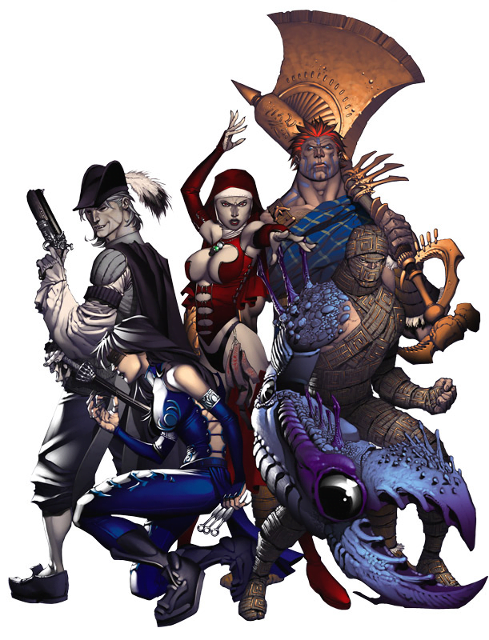
Now, the above content, broadly speaking, covers stuff that I’m personally fine with. I really like this idea – you’re a servant of Hell, then that’s given all these layers of conflict and fundamental failures to make it an interesting challenge. You’re given a very distinctly evil path but a lot of interesting ways to play your character as perceiving that path as reasonable, or acceptable, or just tolerable in the context. This is in my opinion, some of the Good Shit. I don’t think it’s bad that this book uses abusers as central characters, and I think making the forces of Hell into confused, psychologically understandable bad bosses rather than Inherently Evil, Evil For The sake of Evil Evilness Evils is a really interesting take.
This kind of idea space is not the majority of this book, though. There can be very little praise that does not come, in Exalted, without a pause to put on a very big boot to give the work an utter kicking.
I want to make it clear, though, I’m not going to dedicate special time to rubbishing on Exalted’s bad mechanics as expressed here. Not only is there no point – it’d be like mocking a plane for being a bad bicycle – it’s a meaningless problem. I have not dedicated much time to much of the mechanics in this book, with two exceptions, which we’ll discuss later.
No, what deserves special attention and complaint about this book is its tiresome edginess, excessively over-wrought phrasing, and how god-damn rapey it is. It feels wrong to call it “sexual assault” in this book because it both mentions it a lot but also skirts around saying it, creating instead this sort of nebulous fog of rape-ishness, of rape-osity. There’s the way it happens around you, like the way the book implies the Phylactery Womb is being regularly gangraped (and restates that she’s a mentally damaged child), or the way that the transport system of Hell implies you’re being vored in a way that turns the plane on, and that sort of needlessness.
But more directly for an RPG sourcebook, the writers are clearly aware that definitely stating your Infernal character gets gangraped would be very bad, and even more aware that definitely stating your Infernal character has partaken in a gang rape would be even worse.
Now, call me a stickler, but one solution to this would be to simply not include it, but for some reason, the Infernal source material walks right up to the line of declaring these two facts, but then steps back from it the barest millimeter. The writers asked about this refused to clarify one way or the other, which is a messed up sign.
That’s the problem of this kind of needless nastiness, by the way; it’s not even done with a purpose. It’s ashamed of talking about rape but it’s just as much ashamed of clearly stating that it definitely doesn’t want to talk about rape. There’s a wealth of badly thought out ideas in the Exalted canon, most of which hinges on sex and consent, but this is a blight on the book.
There’s always this mealy-mouthed, ‘well, you’re playing monsters‘ line that White Wolf liked to wield in these situations and it always feels like an excuse. Hand-wringing that maybe leaving out the rape references they put in the book would upset as many people as putting them in, and always ultimately erring on the side of putting them in.
I’m not saying that the book should not feature reference to sexual assault, though, for conveniences’ sake, I’d rather they were isolated in some single section of the book that I could easily tell my friends ‘skip this bit.’ I don’t think that the problem is inherent to putting sexual assault in a book, but I do think the way it’s used in this book is bad. Do you think it’s a good idea to tell everyone who plays this game that their murderous devil must also be a rapist? Do you think people can’t appreciate the monstrosity in abuse or violence or torture without making it very clear that yes, that taboo, too, is going to come up?
It feels so juvenile. If you’re going to use rape in your ‘adult’ game, you need to really know what you’re doing. Once you know this is a book that’ll bring it up like that, you spend the rest of your time cautiously scrutinising each page in case it leaps out at you again, like rabbit shit in coco puffs.
Exalted doesn’t know what it’s doing.
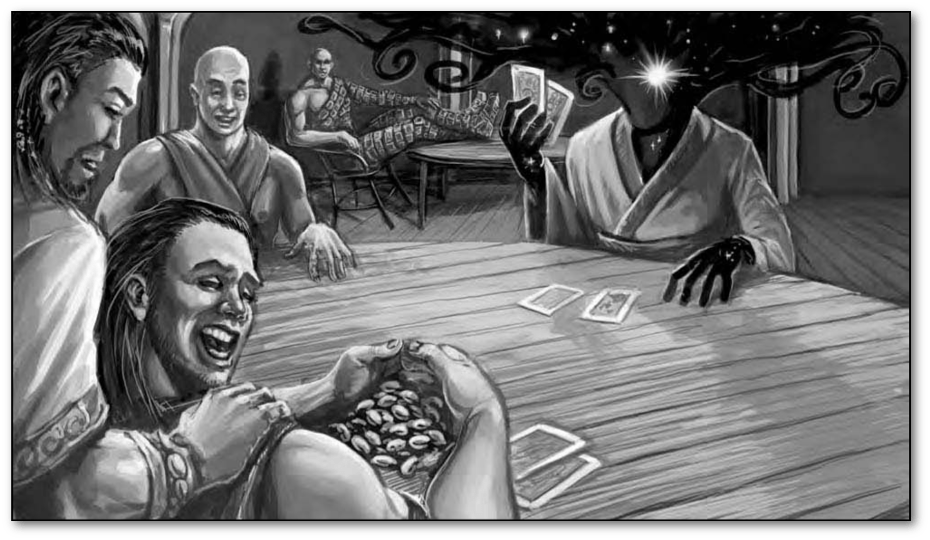
Now, setting aside the utterly awful way this book uses sexual assault, there’s something to these nasty Exalts that I think is genuinely excellent, and it’s a mechanic, even!
If you remember the primer, there’s a Great Curse mechanic in Exalted, where everyone is always struggling with a version of their worst self. Lunars are too beasty, Solars are too tragically cool, Sidereals get dumber the more of them there are, that kind of thing. It’s an extension of Vampire‘s Beast mechanism, where players can do cool things, but too many cool things result in an outburst. I like this mechanic a lot, since it’s a thing players can want to avoid or a thing they can want to indulge, and it gives the storyteller a tool to use to guide players. It’s a thing players want to manage, and that engages them with their choices.
Infernals don’t really have a ‘worst self’ to compete with, though. Instead, the Infernals are beholden to their Yozi owner, and that Yozi owner is hooked into their soul. As you do things like a normal person might do them, including things like being subtle, thoughtful, and at least acting like you can respect the people around you, you slowly build up the impatience of your Yozi owner, who as we have already established, is a massive tool and somewhat incapable of behaving without self-destructive impulses. They’re not just going to get mad that you haven’t done the Reclamation yet, they’re going to get mad at you that you’re not making what they think is progress, and their vision of progress is always flawed because, again, they’re idiots. Build up too much of this impatience and they start torturing you, and may even assume direct control over you to make you act the way they think you ‘should’ act.
The way you placate your doofus villain master, then is by behaving like a doofus villain. Some examples of the things that reduce this tension is to be a kind of card-carrying villain. You can give your opponents advantages over you to show off your strength, and crush them anyway. You can set up elaborate death-traps and lower your opponents into them. There’s even a bonus for leaving them alone there knowing they might escape. Stage a mock forced marriage of a hero’s love interest? Good. Hand the enemy the one weapon that will stop you, then mock them for failing to kill you with it? Better! Stage a public execution of one of your enemies, with an appointed time for them to executed so they have a chance to escape? Marvellous.
You can placate your Yozi lords by explaining your plan to the heroes.
What this means is you get a lot of fun, hammy, theatrical villain behaviour, justified in-universe, and then you need to be the kind of character who can fix the problems this creates, or plan ahead for it. While the other Exalted are managing their own worst selves, you’re instead dealing with an extremely stupid shoulder demon that wants you to behave like a Bond villain or Mother Dearest or an 80s slasher monster, even though that would be way worse than if you did things your own way. I like this tension – you’re left deciding when it’s time to act like an idiot and when it’s time to actually get the knives out. Sometimes, you have to take a loss, sometimes you have to act like a tool when you don’t want to.
There’s also the question of how Infernals exalt. While Solars exalt when they push themselves beyond their limits and succeed at something, the Infernal is instead selected when they have that moment… and fail. The Infernal is approached, afterwards, by a demon, that knows that they’re stinging at the moment of their failure, that they are agonising and wracked with regret, and makes them an offer.
I will make you so powerful that you don’t care about the way you failed today.
And it’s always a lie.
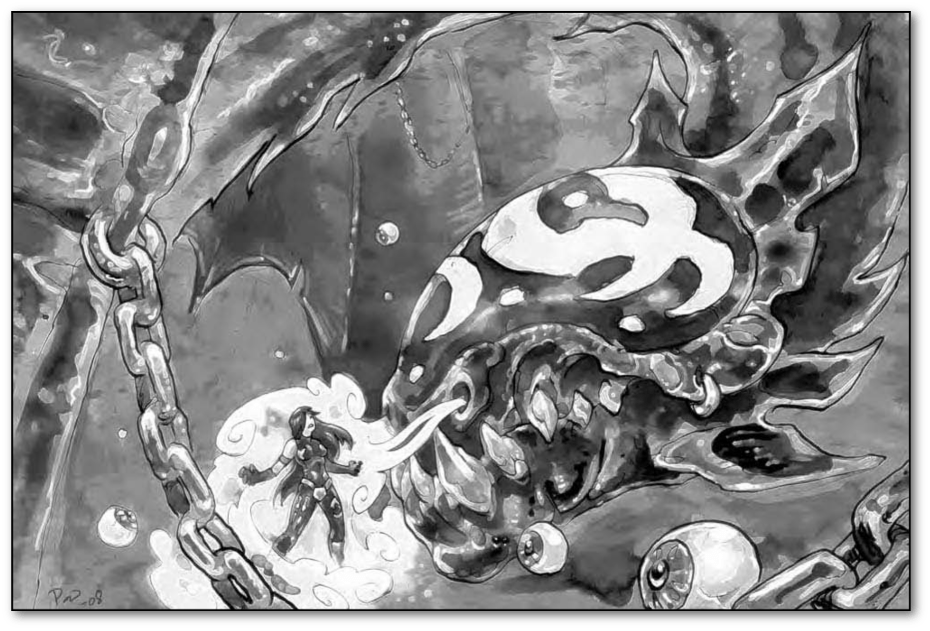
Still, I didn’t spend five thousand words introducing you to this setting and then this rulebook and then a few hundred words apologising for it because this is just a generically good game. This is April, it’s my month, and there’s got to be something more here. What makes Infernals my favourite part of this big, excessive, sprawling, stupid game that I don’t want to play?
Part of it ties into that limiting mechanic – that an Infernal is a villain who wants to play like the villain of a story. You get to do those cool things that a villain does that we’ve all become very aware are bad ideas because they’re not helpful to more pragmatic, boring villains. You’re given an excuse to play in a way that’s fun but it’s also something you have to manage as a game mechanic. It also gives you a hook into the world, of your relationship with your Yozi lord. Do you resent them? Do you pity them? Are you trying to placate them, or are you afraid of them? That’s interesting to me!
It may also be an aesthetic point. Infernals are monstrous, with things like demon features and horns and big chunky crab arms or whatever, and the story doesn’t shy from the fact their monstrosity brings with it the means to create harm, and that means not causing harm is a choice. You get to look big and outlandish and your survival isn’t tied to the armour or gear you’re wearing, because your basic level of survival and will to live are so much higher than anything the armour could affect.
Infernals are powerful, which is important to me, and they exist in a world where their power feels meaningful. Other ‘play a monster’ games will often use a series of masks and nets around the fiction of the universe to stop you from messing things up. Masquerades, as it were. But in Exalted you are absolutely empowered to go out there and start really wrecking some stuff, or weaving vast conspiracies. Good luck doing both with these mechanics, but whatever, that’s not the game’s problem, as the game is very clear about that. I like big, flashy badass characters, I like being able to feel like I can treat a big world like I matter to it, and Infernals absolutely get to do that.
There’s a twist though, because I think I understand what it’s like to spend my life pursuing a goal I was never meant to have. I know what it feels like to have a god on your shoulder, whispering about how you need to hate better, cut out more people, how things would be better if I was burning witches. I feel as much as I have a soul, it is a misshapen, damaged thing, stained black from the beating, or perhaps always malformed, born part-a-person thanks to some fight that predates my birth. I know how it feels to obssess over a point you failed. To live with a storm of thoughts in your head and wonder if some of those thoughts are a monster or are the real you.
The redeemed and noble Infernal, which is obviously where I’d want to take this story, is a monster that walks as a man, a beast that has learned rules that let it learn to be a good person. I find that compelling. I find that that idea matters. Many audiences may regard that as impossible, and fanciful and ridiculous, and I don’t blame them, but I hope it’s true.
I hope it can be true.
One final note; in an online supplement, there was an extra charm tree introduced for the Infernals. A tree that let the Infernal decrease the influence of their Yozi owner, create their own inner world, then populate that world with spirits that connect to their souls, culminating in crafting your own demonic family and servants, and eventually slipping the bonds of what it means to be an Infernal. Whatever it is you are, you’re now something else and inasmuch as the Yozis can tell what it is, it’s wrong. If you pursue this tree, you become public enemy #1 for your former allies, because they don’t know what you’ve become but they are 100% sure they cannot let you exist.
This charm tree is called ‘Heresy.‘
